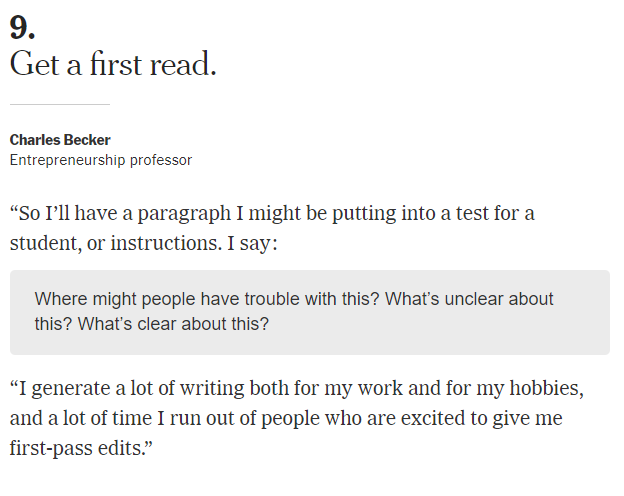Castle in the Sky is a metaphor for experiencing a new idea so powerful that it changes the way you see the world. My name is Charlie and my mission in life is to explore these experiences and empower others to find and embrace them. This weekly newsletter is where I share personal updates alongside a bit of truth, beauty, and humor to combat intellectual loneliness and existential boredom.
“Consistency trumps intensity.”
-Bruce Lee (Paraphrased)
I'm working on a bunch of stuff that should be coming out in the summer. The last two weeks were crazy, plus it’s the end of the semester and the start of Write of Passage. Here’s the best stuff I read, thought about, or experienced this week:
I was mentioned in a New York Times article.
I found my best use case for ChatGPT so far.
I read something beautiful from a friend that reminded me of one of my favorite essays.
Plus, shout-outs and updates in Crowd Work.
🏰Also, Substack told me this issue was too long for an email, so if you don’t mind, click through to read this issue on the website or the app so you get it all.
I was mentioned in a New York Times article.
A friendly reporter from the New York Times reached out to me about a month ago because I was tweeting a lot about how I use ChatGPT. The reporter and I had a brief conversation where they interviewed me about what I tweeted but we didn’t talk again after that.
Lo and behold, last week someone sent me this article, where they printed a quote from me! Scroll down to number 9. If you want to see the whole thing but don’t have a subscription, it was simultaneously published here on msn.com. Here’s a screenshot of the premise of the article and my quote, but I recommend checking out the whole thing if you’re interested in ChatGPT and how to use it better.
This leads me to my next thought.
I found my best use case for ChatGPT so far.
At the time I was “interviewed” by the New York Times, what I said was true: my best use case was getting a quick and dirty first-pass edit for the prodigious volume of writing I produce.
However, I never thought the editing was super high quality. When you ask ChatGPT to write, it feels like an impression of a good writer, not like a good writer. Plus, it felt like ChatGPT was saving me a few hours, not necessarily creating some kind of 0-to-1 binary benefit that wasn’t there before.
That has changed. I’m an entrepreneurship professor for my day job, and a huge part of my grading is for one course where the majority of exams and assignments are submitted as Excel spreadsheets. The course is fun to teach but I don’t have a TA and grading these spreadsheets is the bane of my existence.
I had tried using ChatGPT to program for me before, in Python, but I was too ignorant. When I use it for writing, it’s easy because I know enough to troubleshoot, and I use the AI as a tool—so it’s saving me time doing things I could do rather than doing something I can’t. For programming, I couldn’t see the silly little mistakes a programmer would catch, so I couldn’t troubleshoot the work it produced, and I could never get anything to work.
But I realized that I know enough about Microsoft Excel and macros that maybe I could make it work. So I told ChatGPT about my predicament in my entrepreneurship course with the heavy grading. Then I asked it to teach me to write an Excel Macro (a mini-program that runs in Excel) that could do a first-pass grade so I could devote time to the more complicated problems, and voila! What originally took me 4-5 hours per submission now took me about ninety minutes.
This has been a game-changer, as it allows me to focus on problems that students need explained more deeply, rather than manually checking twenty-four hundred cells in Excel every couple of weeks.
Note: I use ChatGPT all the time, all day long, for a lot of my work. But Twitter, the main social media I use, is drowning in ChatGPT content drivel, so I never thought to write or post about it. Recently though, a lot of people have asked me to write more about it. I was also given an award for technological innovation in the college I work in because of my fluency with it and my use of it. So it has made me re-examine that I might be in deeper than I realized. If you would be interested in reading about how I use or think about ChatGPT, please drop a comment below with questions or suggestions.
I read something beautiful from a friend that reminded me of one of my favorite essays.
I want to share some stuff I’ve been thinking about today that touches on feeling feelings, navigating parenthood, remembering childhood, interpreting dreams, and creating safety.
It all started when my friend Simone wrote a great story in her newsletter about a drive she took recently. For me, reading it was like a gut punch, I was just absolutely overcome with feelings—read it for yourself at the link below. (But first click the 💗 for me though, because it’s such a good story you might forget what you were doing and not come back!)
You might recall an essay I wrote a few weeks ago called Get into Character about my Mom. But reading Simone’s essay, I remembered that I’d written about my Mom before, and that a newsletter issue from Simone (along with a video by Michael Ashcroft) was what inspired me to write it. Here’s the the essay I wrote:
Here’s the original newsletter Simone wrote that got me thinking about parenthood and feelings:
And for good measure, here’s the great video by Michael Ashcroft that got me thinking about childhood, youth, and safety:
Maybe you’ve read something here today that inspires you to create something, the same way Simone and Michael did for me. In that case, I hope you in turn feel inspired to share this newsletter later.
Crowd Work
Last week in Castles in the Sky 30 I wrote about approaches to travel based on two of my fellow writers’ essays, and both of them (
and ) were kind enough to stop by in the comments:One really awesome shout-out from last month I forgot to mention was
's shout-out in his newsletter. John is an interesting writer (and a beast of a marathoner) who I have a lot of respect for, so his recognition here was very flattering:✍️ Essay: Who Cries for the Robot? by
Charlie Becker, in which he shares his experiences using ChatGPT. He has an interesting theory – since writing machines are designed to imitate humans, they will become jealous of us by design. They will become mimetic. This is the social theory pioneered by philosopher René Girard, who argued that we are prone to derive value from things perceived as valuable by other people (the fast car, the big house, the sexy partner). This is why we get involved in status games. I like Charlie’s conclusion:
“Humans have never had cause to think of their humanity as a quality worth envying, until now… And I think reconsidering what makes us human and being a little overprotective of it is not necessarily a bad thing.”
I also got some very kind comments from
and hw on my essay A Pilgrimage for Book People. (A quirk of Substack tags is I cannot tag someone with a two-letter name, apparently, so thanks hw!)











Congrats on the mention in NYT. It's very well deserved. I love what you shared in our fiction collective today about how you use it as well.
Love seeing you continue to explore the personal, especially about your family, in these newsletters. Thanks for sharing.
Hey Charlie, I have used ChatGPT for some very basic "research" in the past and regularly use Notion AI to help me with editing, summarizing as a part of my note taking app. I'm always on the look out for best ways to use it in other use cases, would love to read about yours.